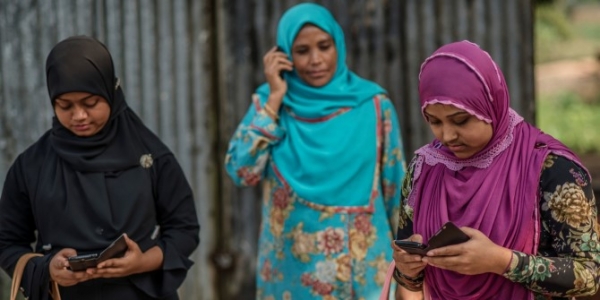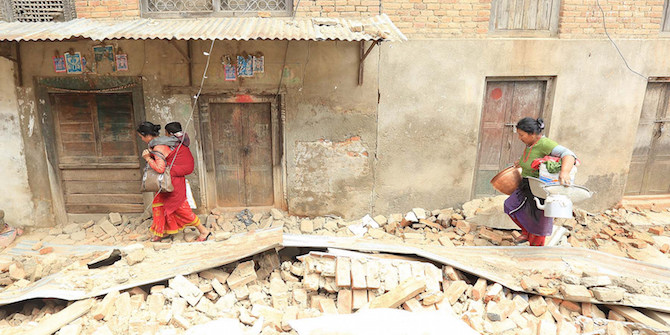
 Temporary labour migration from Bangladesh to the Middle East is commonplace, but workers are often at risk of being exploited because they don’t speak the local language or lack basic skills. The Government of Bangladesh offers training but in the past the time and cost commitments involved have been prohibitive for many aspiring migrants. Here Ayesha Khanom and Shakhwatul Islam discuss how m/e-learning platforms are making the training more accessible to all citizens, particularly women.
Temporary labour migration from Bangladesh to the Middle East is commonplace, but workers are often at risk of being exploited because they don’t speak the local language or lack basic skills. The Government of Bangladesh offers training but in the past the time and cost commitments involved have been prohibitive for many aspiring migrants. Here Ayesha Khanom and Shakhwatul Islam discuss how m/e-learning platforms are making the training more accessible to all citizens, particularly women.
At technical training centres across Bangladesh, like the Bangladesh-Korean Technical Training Centre (BKTTC) in Dhaka, only voices are audible from the long, empty corridors. It is the low hum of people learning together. When visitors enter the teaching room, they are greeted with an ‘Assalamualaikum’ in unison. Almost 50 women are gathered, having come from different corners of Dhaka and beyond for a 12-day training.
One of the participants, Shopna Akhtar said, “This course has become compulsory for aspiring migrant workers going to the Middle East with a work permit.” The 28-year old mother hails from Shariatpur, a district south of the capital, and is staying in Mirpur at a relative’s house for the training.
Shopna married when she was 17 but her husband left her for another woman when their son was seven. Since then, she has started caring for her aged in-laws as well as her own ailing mother. Shopna says she had no dreams before, “I wanted lead a simple life. I thought it was enough if I could feed my family three square meals a day.”
However, as the sole breadwinner, Shopna faced with growing challenges as their cash reserves gradually dwindled. Shopna realised that it was not long before her family would have to start begging. She made the tough choice to leave her family in the care of her neighbours to go to Saudi Arabia in search of a higher and more stable income. “This is the only way I can feed my family and give my son a better future.”
Shopna serves as an interesting example, but each of the women at the training have an equally compelling story. Temporary migration from Bangladesh to the oil rich gulf countries is not a new phenomenon by any means, especially for men and women from lower middle income families. This is illustrated by the fact people from India, Bangladesh, and Pakistan now comprise over 90 percent of the private workforce in the United Arab Emirates, which is among the leading oil-rich nations.
However, poor skills and no knowledge of Arabic resulted in many workers being exploited, tortured and even sent back. This contributed to the Labour and Social Development Ministry of Saudi Arabia’s decision to ban recruitment of Bangladeshis, except for domestic helpers, in 2010. The ban was only lifted in August 2016.
Bangladeshis wishing to migrate to Saudi Arabia with a work permit used to seek help from manpower brokers or middleman which often cost them a lot and sometimes unsuspecting villagers would fall prey to rogue brokers who made off with their life savings. These problems were aggravated by the ban.
Given the scale of migration it is perhaps no surprise that there are 23 ministries and 27 directorates within Bangladesh’s government which are mandated to look after pre-, peri- and post-migration issues including the skilling and education of people like Shopna. However, they struggle to deliver sufficient services due to the limited scale and number of training facilities across Bangladesh, restrictive budgets and a scarcity of trainers.
To help address these challenges, the a2i initiative under the Prime Minister’s Office (PMO) of Bangladesh has developed a national e-learning platform in partnership with government stakeholders and others. This has been aptly titled MuktoPaath, meaning ‘open learning’, where anyone can easily find, view and download validated e-learning content, including video tutorials, on different skills that migrant workers might require abroad. These range from language training to guides on how to use hi-tech appliances for domestic workers.

Instead of having to travel to the head office of the skills provider agency in the district headquarters, aspirant migrant workers can now visit one of more than 5,200 Digital Centres spread across the country, where they can register online and enroll for training courses. The Centres are run by entrepreneurs who are able to offer assistance to those who are less digitally literate. Once they have completed the application, workers receive an SMS message with the details of their training.
Previously, the training was a 30-day commitment requiring in-person participation. Even though the training fee was subsidised by the government, the trainees had to bear their own accommodation and travel expenses which was a huge economic burden for them. Now, they start with offline mobile learning materials that can be copied on to the memory card of their mobile phones or purchased on SD memory cards from the Digital Centres. Alternatively, e-learning versions for the same audio-visual content is available for view and download on MuktoPaath’s YouTube channel and website, as well as BKTTC’s website. Enrolled trainees work towards a pre-training assessment exam using the e/m-learning content at home. Once they pass the exam they are then selected for the training program at the BKTTC.
As a result, the course in Dhaka is now just 12 days, saving students an average of 60-70% in training-related expenses. Materials continue to be available online and on mobile after the training, so students can revisit them at a later date as needed. As a result, this e/m-learning initiative is helping women to develop their skills and confidence, enabling them to earn more for their families and contribute to Bangladesh’s GDP.
This article gives the views of the authors, and not the position of the South Asia @ LSE blog, nor of the London School of Economics. Please read our comments policy before posting.
About the Authors
 Ayesha Khanom is a freelance writer with Access to Information Project at the Prime Minister’s office in Bangladesh. She is also working full time as a communication officer at the University of Liberal Arts Bangladesh, where she completed her undergraduate degree in Media Studies and Journalism.
Ayesha Khanom is a freelance writer with Access to Information Project at the Prime Minister’s office in Bangladesh. She is also working full time as a communication officer at the University of Liberal Arts Bangladesh, where she completed her undergraduate degree in Media Studies and Journalism.
 Shakhwatul Islam is an Innovation Associate in the a2i project at the Prime Minister’s office in Bangladesh
Shakhwatul Islam is an Innovation Associate in the a2i project at the Prime Minister’s office in Bangladesh







